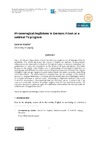Identificador persistente para citar o vincular este elemento:
https://accedacris.ulpgc.es/jspui/handle/10553/70387
| Campo DC | Valor | idioma |
|---|---|---|
| dc.contributor.author | Fiedler, Sabine | en_US |
| dc.date.accessioned | 2020-02-19T21:23:25Z | - |
| dc.date.available | 2020-02-19T21:23:25Z | - |
| dc.date.issued | 2018 | en_US |
| dc.identifier.issn | 1133-1127 | en_US |
| dc.identifier.uri | https://accedacris.ulpgc.es/handle/10553/70387 | - |
| dc.description.abstract | Due to its role as a lingua franca, English has become a major source of language influence worldwide. This article addresses the impact of English on German. Contact-induced influences can be observed at all levels of the linguistic system in German, extending from preferences for particular morphemes to the structure of texts and genres. This study focuses on the largely under-studied area of phraseology. Phraseological Anglicisms, i.e. word-groups and sentence-like units such as catchphrases, proverbs, formulae and slogans of English origin, are gaining ground, particularly in fields like media, journalism, advertising and entertainment. The phenomenon is analyzed here via the example of the German satirical TV program heute-show. It is shown that the modification of phraseological units is an oft-used technique of political satire. Phraseological Anglicisms represent about one third of all occurrences in the examined data set, and thus play an important role. They most commonly take the form of political slogans, titles of films and brand names. The discussion focuses on particular types of modification and whether the German audience understands and appreciates them. | en_US |
| dc.language | eng | en_US |
| dc.relation.ispartof | LFE. Revista de Lenguas para Fines Específicos | en_US |
| dc.source | LFE. Revista de lenguas para fines específicos [eISSN 2340-8561], v. 24 (1), p. 71-95 | en_US |
| dc.subject | 570107 Lengua y literatura | en_US |
| dc.subject | 550510 Filología | en_US |
| dc.subject.other | Anglicism | en_US |
| dc.subject.other | Phraseology | en_US |
| dc.subject.other | Tv satire | en_US |
| dc.subject.other | Humour | en_US |
| dc.subject.other | Modification | en_US |
| dc.subject.other | German | en_US |
| dc.title | Phraseological Anglicisms in German: A look at a satirical TV program | en_US |
| dc.type | info:eu-repo/semantics/article | en_US |
| dc.type | Article | en_US |
| dc.identifier.doi | 10.20420/rlfe.2018.223 | en_US |
| dc.investigacion | Artes y Humanidades | en_US |
| dc.type2 | Artículo | en_US |
| dc.identifier.ulpgc | Sí | es |
| dc.description.esci | ESCI | |
| dc.description.dialnetimpact | 0,0 | |
| dc.description.dialnetq | Q1 | |
| dc.description.dialnetd | D2 | |
| dc.description.erihplus | ERIH PLUS | |
| item.grantfulltext | open | - |
| item.fulltext | Con texto completo | - |
| Colección: | Artículos | |
Visitas
61
actualizado el 10-ene-2026
Descargas
154
actualizado el 10-ene-2026
Google ScholarTM
Verifica
Altmetric
Comparte
Exporta metadatos
Los elementos en ULPGC accedaCRIS están protegidos por derechos de autor con todos los derechos reservados, a menos que se indique lo contrario.
